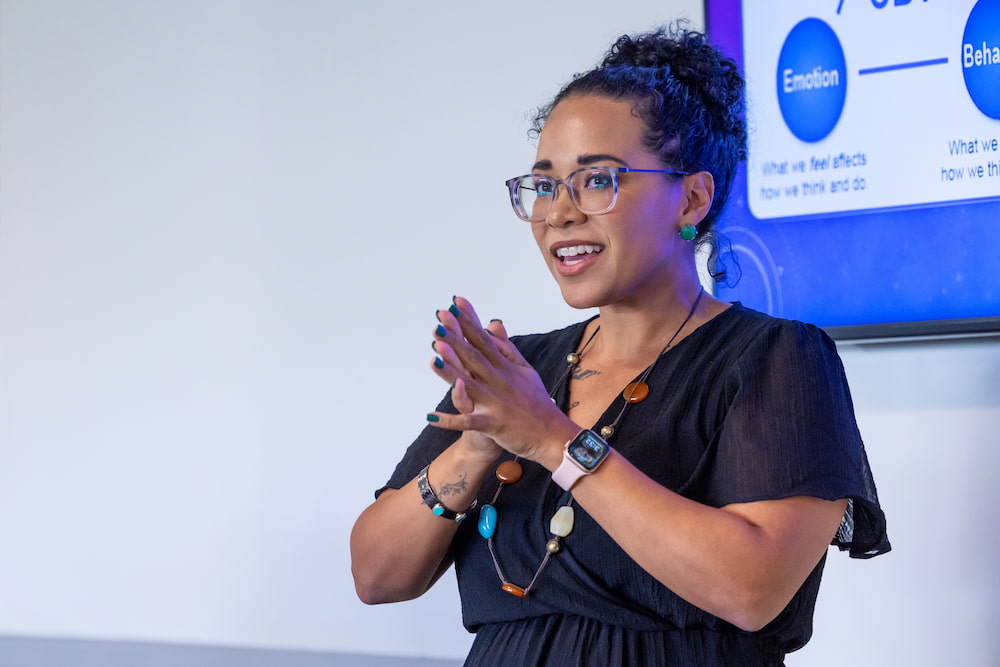Dr. Dumayi Gutierrez Brings Intersectional Focus to Couple and Family Therapy at CU Denver
Julie McMorris | School of Education & Human Development Sep 22, 2025.jpg?sfvrsn=beeaf5b4_1)
When Dumayi Gutierrez, PhD, LMFT, LMHP, entered the University of Iowa as an undergraduate, she imagined a future in medicine. But a single class shifted her path entirely.
“I thought I was going to go into medical school and obstetrics and gynecology, because I had really enjoyed science in high school and growing up,” she said. “But once I got to college, I realized that it wasn’t really my passion. I knew that I wanted to help people; I just didn’t know in what way that was going to look like for me.”
That clarity came when Gutierrez took a Human Sexuality course. “That class floored me and changed the direction of my career and my life,” she said. “I came to really love learning how people loved, how people expressed themselves, our identities, how they worked emotionally and mentally.”
The course shaped not only her professional path but also her personal journey. “In that class, I discovered my identity as a lesbian as well as my career,” she said. “My professor, who became a huge mentor and was the first person I came out to, introduced me to couple and family therapy.”
Gutierrez went on to earn her master’s degree in the field, then pursued research that has since centered BIPOC and LGBTQ communities, particularly Latina and Latinx LGBTQ families.
Grounded in theory, shaped by community
Over the years, Gutierrez has worked in Iowa, New York, Nebraska and California, serving diverse populations and testing the applicability of her therapeutic approaches. She draws heavily from experiential models such as the Satir growth model, as well as collaborative language systems and narrative therapy.
“I really resonated with those theories,” she said. “They emphasize centering primary emotions, examining how language shapes our lives, and recognizing that the self of the therapist is an integral part of therapeutic change.”
Her clinical work has consistently addressed the broader contexts influencing families. “It’s not just recognizing the issues they’re coming in with and working with the family unit,” she said. “It’s also asking: what social, cultural, and political policies are impacting our families?”

Teaching and supervision with cultural humility
As she begins her role as assistant professor of couple and family therapy at CU Denver, Gutierrez brings her bilingual background and cultural identity into the classroom.
“With my culture, we have so many strengths: bonding, reflecting, listening, pride in who we are,” she said. “At the same time, I recognize the tensions within families, including my own, around identity. So, I encourage students to examine the strengths of their cultures, but also to deconstruct what may not benefit their growth or their clients’ growth.”
That perspective, she added, is vital in preparing future therapists. “Not only are students learning content and theory, but they’re also simultaneously learning so much about themselves and their social locations. The students I see at the beginning of a semester are so different from the students I see at the end. It’s an honorable place to hold that space for their growth.”
Gutierrez said the exchange goes both ways. “As much as my students are growing, I also grow alongside them. I’m a lifelong learner, and they’re always teaching me something new.”
Research and writing with impact
Beyond teaching, Gutierrez is an active researcher and author. She co-authored "Interracial, Intercultural, and Interfaith Couples and Their Families: A Clinician’s Guide," a text that provides clinicians with practical tools rooted in intersectionality and ecological systems theory.
“[My co-author and I] wanted clinicians to really consider not just how partners communicate, but how intersecting identities, cultures, families, and societal influences shape that communication,” she said. “The book encourages therapists to reflect on their own identities and privileges, too.”
At CU Denver, Gutierrez is already developing new projects. She is launching a longitudinal study on Black and Brown LGBTQ families’ experiences with family therapy, in partnership with colleagues in New York and California. “We’re working to test an innovative model for the field,” she said. The study will include focus groups, clinician training, and eventually nationwide implementation.
She is also working on a book and documentary highlighting Latina joy and resilience. “So much of the narrative has been around adversity and struggle, which is real and important to acknowledge,” she said. “But there’s been little room for the strengths of our community. This project is about being immersed in joy and putting those themes forward.”
Drawn to CU Denver
Gutierrez, along with her wife and two daughters, relocated to Denver from San Diego, and the opportunity at CU Denver came at the right moment. “I realized I thrive as an in-person instructor, and I wanted to put more emphasis on research and community involvement,” she said.
She found CU Denver’s Couple and Family Therapy program aligned with her values. “We are very much centered on social justice, intersectionality, and advocacy,” she said. “I knew I would be supported here, and that I could have conversations that move the field forward.”
For Gutierrez, joining the School of Education & Human Development represents both a professional and personal turning point. “It was a really easy decision,” she said. “This is a community where I can teach, research and advocate for the families and communities I care deeply about.”